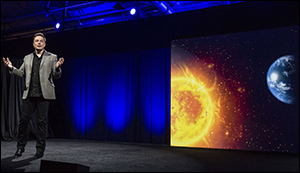The details behind SpaceX’s ambitious satellite internet experiment
26. 7. 2016 | Quartz | www.qz.com
New details have emerged about SpaceX’s ambitious plans to launch a huge constellation of micro-satellites designed to provide internet service here on Earth.
The company wants to start with two identical microsats, launched on its flagship Falcon 9 rocket. The satellites will communicate on high-frequency Ku-satellite spectrum to reach three ground stations on the west coast of the US—SpaceX operations in Los Angeles and Redmond, Washington, and at Tesla Motors (Musk’s other company) in Fremont, California—in order to test the broadband antennas built into the satellites.

The satellites will orbit at an altitude of 650 kilometers, about 150 km closer to Earth than most other communications satellites, which is one way that SpaceX hopes to reduce the lag between data transmission and reception. The company forecasts spending about 10 minutes of every day conducting test link-ups with the satellites, which can transmit both video and telemetry data.
The primary reason for the filing with the FCC is to assure the government that these tests will not interfere with other communications broadcasts. Such licenses are typically approved or denied within six weeks.
Read more at Quartz
Image Credit: AP Photo/Ringo H.W. Chiu
-jk-




